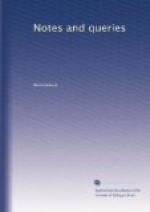There are various other points bearing upon the subject of the Collar of SS., upon which I wish to offer some remarks, and with your permission I will return to the subject. I cannot, however, conclude without observing, that it would much add to the value of MR. NICHOLS’ compilation if he would extend it so as to embrace a description of the floreal coronet of knighthood, the belt of honour, the helmet, scarf, ring, spars, &c.,—all indeed, that the words “ad recipiendum a nobis ARMA MILITARIA” implied in the ancient proclamations for taking the order of knighthood. If MR. NICHOLS, in addition to this, will show also wherein the knights of this equestrian quality differed from such persons as were distrained “ad se milites faciendos,” he will solve a number of knotty difficulties in heraldic literature, and will enable the public generally to understand that there are many more chivalrous rights and privileges inherent in the subject than what is dreamt of in the philosophy either of the court at St. James’s, or the college on St. Bennet’s Hill.
ARMIGER.
* * * * *
TENYSON.—COLERIDGE.—EXTRACT FROM BAKER’S MSS. ON BARTH. DODYNGTON, AND WILLIAM JENKYN.
The well-known lines in Tenyson’s Locksley Hall,—
“This is
truth the poet sings,
That a sorrow’s crown of sorrow
is, remembering happier things.”
appear to be taken from Dante (Inferno, canto v. Verse 121.),—
“nessun
maggior dolore,
Che ricordarsi del tempo felice
Nella miseria.”
which is imitated by other writers, quoted by Mr. Cary. (Chaucer, Troilus and Creseide, iii. 1626. Marino, Adone, c. xiv., st. 100. Fortinguerra, Riciardetto, c. xi. st. 83.)
In Coleridge’s second Lay Sermon (ed. 1839, p. 365.) the passage— {196}
“What are you,” (a philosopher was once asked), “in consequence of your admiration of these abstruse speculations?” He answered; “What I am, it does not become me to say; but what thousands are, who despise them, and even pride themselves on their ignorance, I see, and tremble.”
is a quotation from Schiller (Werke, vol. i., p. 414. 1838)
“AN DIE MUSE.
“Was ich ohne dich waere, ich weiss
es nicht; aber mir
grauet,
Seh’ich, was ohne dich Hundert und
Tausende sind.”
In Appendix (B.) to Coleridge’s first Lay Sermon (p. 276.), we read,—
“An age or nation may become free from certain prejudices, beliefs, and superstitious practices, in two ways. It may have really risen above them; or it may have fallen below them, and become too bad for their continuance.”
Though not given as a quotation, this passage is no doubt borrowed from Baader, as quoted by Archdeacon Hare in a note to his Sermons on the Mission of the Comforter,—




